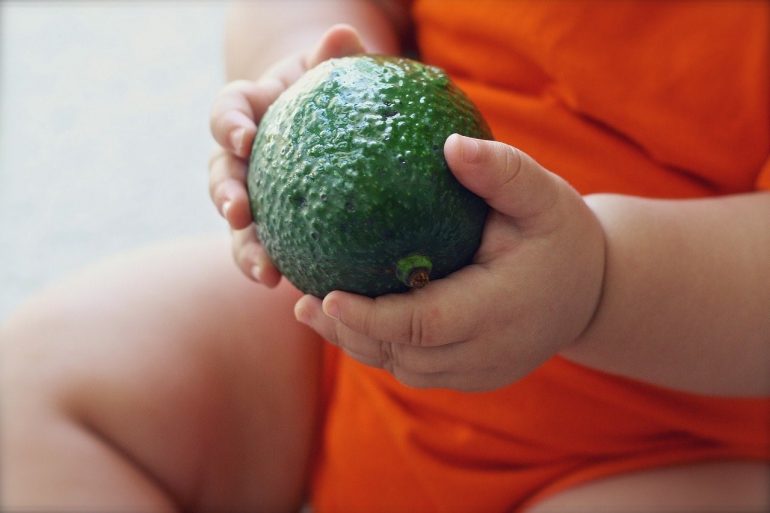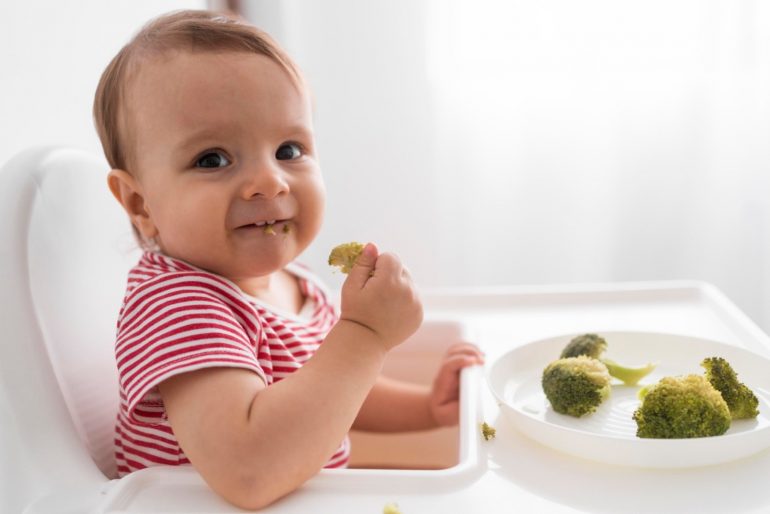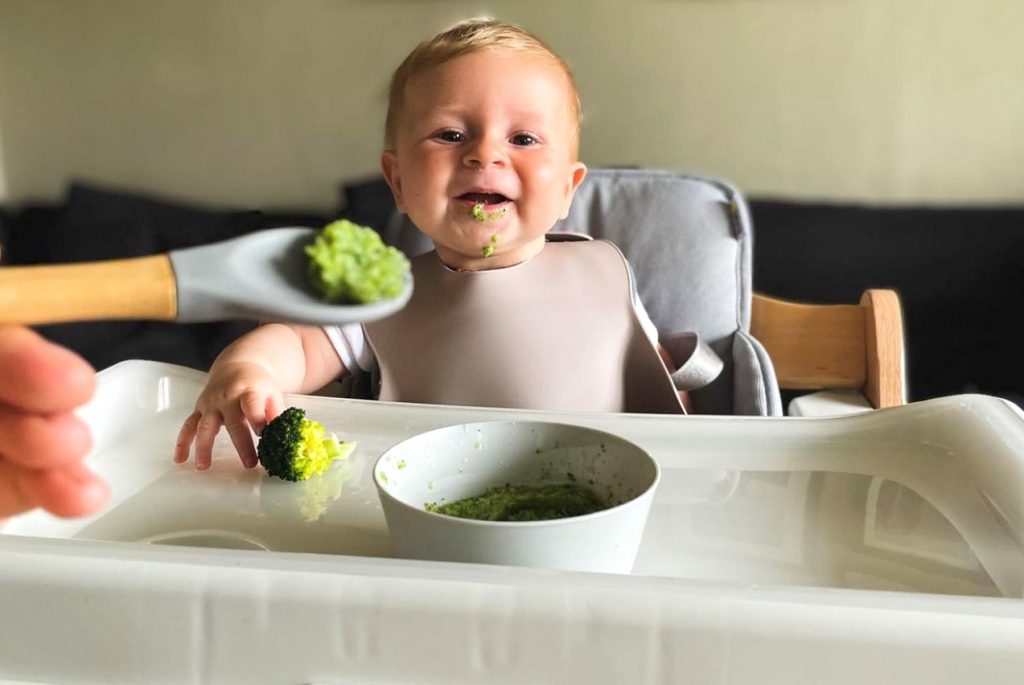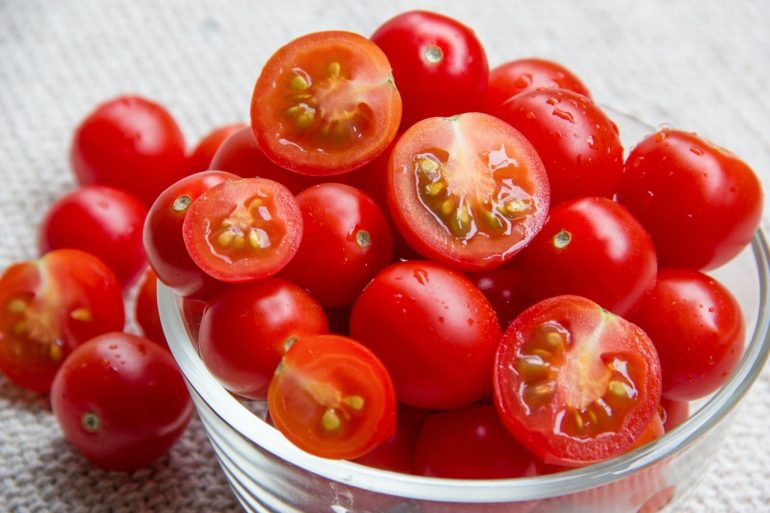We all know the good that vegetables bring to our kids and even when we start the whole weaning process, veggies are the first and frankly, easiest foods that we puree for our little bubs. Filled with a whole host of complex carbs, vitamins, minerals, fibre, and antioxidants, vegetables are at the heart of health and wellness in everyone’s diet. Here’s our guide to choosing the best veggies for your baby at every stage and fuss-free ways to prep them so that you’ll be able to keep the struggles at bay – fingers crossed!
Babies Starting On Solids (6 To 8 Months)
Softer veggies that are easily pureed are your best bet at this stage when you’re weaning your little one and introducing them to an array of tastes.
Avocado
Technically a fruit but it’s packed with so many key nutrients that we’re giving it the number one spot on our list here! Boasting Vitamins A and C as well as Niacin, Folate plus a whole host of minerals, avocados have been said to be the perfect supplement for breastmilk. What’s more, there’s no need to cook it. All you have to do is take out the pit of a ripe, slightly soft avocado, scoop the meat out and mash it for baby – voila!
Pumpkin
This gourd is a great introduction to veggies for your little bub as its sweetness makes it more palatable. Pumpkins provide a smooth consistency once steamed and pureed. If your baby seems to like a bit more texture, simply mash the cooked pumpkin with a fork and that’s it! You can also dilute the puree with water or even breastmilk for a thinner consistency if need be. How about freezing the puree in ice-cube trays and offer to your baby to cool off on a hot day?

Sweet Potato
Sweet potatoes are super easy to prep for your baby and similarly with carrots and pumpkins, they are rich in Vitamin A which supports vision, Vitamin C for immune-boosting properties and also fibre, magnesium and calcium. Aside from the usual steaming or boiling method to prepare sweet potatoes, you can also wrap them in foil and bake to perfection before pureeing or mashing them up to feed your baby.
Spinach
Popeye’s favourite veg is ours too! Spinach is one of those super veggies that you should introduce to your baby as it’s filled with vitamins that improve immunity and maintain a strong and healthy body. These include Vitamin A, C, E, K, thiamine, and folate. It is also a wonderful natural laxative with ample amounts of dietary fibre. What’s more, spinach has shown positive results in protecting the liver. How to prepare it? Simple! Just steam, boil, and blend!
Carrots
This orange veggie is a given when it comes to it being one of baby’s first foods. Once boiled or steamed, carrots make a beautiful puree and it’s not green, which might for some reason make it easier to introduce it to your baby. The beta-carotene in carrots converts to Vitamin A that boosts vision and immunity. As well, carrots are rich in minerals like potassium, iron, magnesium, and calcium.
Peas
Whether fresh or frozen, peas are great for your little one! They are an excellent source of Vitamin C, K, folate and fibre, and also help to maintain eye, brain and bone health. Similarly with spinach and most other veggies, you just need to steam them and blend. The slight sweetness that peas have may make it more palatable for your baby.
Older Babies Who Are Familiar With Solids (8 Months On)
Broccoli
Another one of our faves? Broccoli! These florets are bursting with goodness from Vitamin C and K to calcium and not forgetting the all-important iron that’s necessary for the healthy growth and development of your baby. Once your little one is relatively proficient with pureed veggies, start introducing broccoli and make sure that it is squashable between your finger and thumb. Broccoli naturally comes with a little stem and floret making it the easiest first foods especially for baby-led weaning. All you have to do is to ensure that the broccoli is steamed or boiled well, can be squashed easily and then your little one can explore with it. From 12 months on, you can cook the broccoli a little less, but it shouldn’t be raw and too crunchy until it becomes a choking hazard.

Cauliflower
Like broccoli, cauliflower also presents itself as easily handled by babies because of its shape and size, except that it is not green. It is one of the most nutrient-dense veggies around and when cooked properly, can also be one of the most delicious! Cauliflower has the tendency to cause gas, so it is generally not recommended to introduce to babies at an early stage. You might want to introduce this later especially if you little bub tends to be a bit gassier and has a sensitive stomach. It does contain a whole load of vitamin C, is high in fibre and a good source of folates plus Vitamin Bs. Boil it, steam it, roast it – easy!
Cherry Tomato
Tomatoes have tons of Vitamin C and are great to pair with peas and other veggies. They are also packed with carotenoids that provide antioxidant and anti-inflammatory benefits to our bodies. Tomatoes are also known to promote eyesight, immunity, and heart health. Why cherry tomatoes instead? These are super fuss-free finger food, and its slightly sweeter taste might be more akin to baby’s taste buds. Cut the tomatoes in half before serving it to your baby or you can smash them between your fingers if your little one needs more guidance when eating them. Always ensure you keep a watchful eye when serving up these slippery little tomatoes as they can cause your baby to gag or choke.
Cucumber
Pretty much tasteless, cucumbers are actually considered as fruits and there are a different variety available in the market. When you first introduce your baby to cucumbers, remove the outer skin and seeds. Initially, you may mash or puree cucumbers, then gradually introduce smaller chunks as your baby learns how to chew his/her food. If your little one is teething, you can even peel a cucumber, half it, and offer to him/her for a cool, crunchy, teething relief. Cucumbers are 95% water so they are also wonderful in promoting hydration.
Edamame
These whole soybeans that are either shelled or in the pod, are perhaps the easiest and kid-friendly form of soy around. Edamame is rich in calories, fat, sodium, dietary fibre, protein, folate, manganese, phosphorus, as well as Vitamin K. You can start your baby on edamame in cooked or pureed form from the age of eight months, and in the form of whole beans if your little one is over 18 months and can properly chew his/her food. They are also great to train up fine motor skills when your baby is old enough to self-feed. It is always best to cut up the beans into halves or quarters to prevent choking until your child is around three years old.
As with other solids, it might not all be smooth sailing when you start introducing vegetables to your baby. He/she will start to pick and choose or even outrightly reject a certain veggie from the start. Whatever it is, do not give up! Introduce and re-introduce again and who knows? The vegetable that he/she used to dislike is now one of her favourites! Rest assured that you’re giving your little one the best chance of developing a veggie-loving palate by introducing a wide variety of veggies and preps from the start. Allergic reactions to vegetables are uncommon, but if your baby presents symptoms like vomiting, diarrhoea, wheezing, hives, or a rash after eating a particular veggie, consult your paediatrician immediately.




